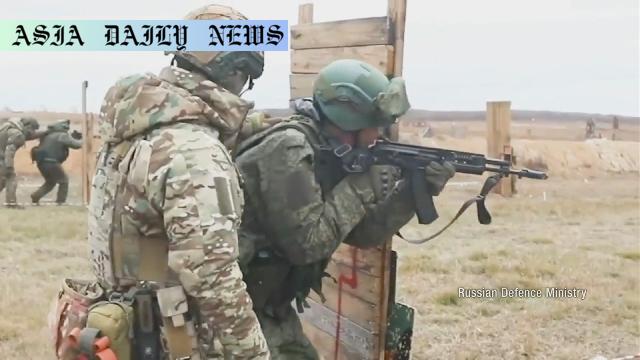North Korean Soldiers undergo rigorous combat training for offensive operations in Russia’s Kursk region.
Key Point 1: North Korean soldiers were seen undergoing combat training in Russia.
Key Point 2: They were trained to seize control of Russia’s Kursk region from Ukrainian forces.
Key Point 3: Soldiers expressed admiration for leader Kim Jong Un in the video.

North Korean Soldiers Engage in Rigorous Combat Training in Russia
Recently, the Russian defense ministry released video footage claiming to showcase North Korean soldiers undergoing intense combat training. This intriguing development demonstrates a notable collaboration between Russia and North Korea during a time of global tension. The training session, aimed at mastering battlefield strategies and weaponry, seemingly involved preparation for operations tied to seizing the western Russian region of Kursk from Ukrainian forces.
The released footage portrays North Korean soldiers conducting a variety of exercises under the supervision of Russian military personnel. These drills included shooting automatic rifles while maneuvering through trenches, a critical skill in modern warfare scenarios. The imagery of soldiers in helmets featuring the Georgian Ribbon, a symbol of the Soviet Union’s fight during World War II, appeared intentional, signifying a unified front between the two nations.
The Symbolism and Unity in the Video
One notable aspect of the video is the North Korean soldiers’ use of orange and black-striped Georgian Ribbons on their helmets. This subtle yet powerful gesture symbolizes their solidarity and alliance with Russia amid ongoing regional battles. Such symbolism harks back to Russia’s historical victories, linking the present conflict with reminders of past triumphs. The display of unity was further highlighted as soldiers were seen marching and singing in adoration of North Korean leader Kim Jong Un. The chosen song, often broadcast on North Korean television, is deeply emblematic of their loyalty and respect for their nation’s leadership.
Broader Implications of the Russia-North Korea Partnership
This collaboration marks a significant turn in the geopolitics of the region. By involving North Korean forces on Russian soil, both nations appear to send a robust message to the international community about their readiness to cooperate for mutual interests. Such alliances could alter the dynamics of ongoing conflicts while raising questions about the strategic motives behind Russia enlisting North Korean soldiers for these operations. Moving forward, this evolving partnership is likely to be closely monitored by other global players.
In conclusion, the footage released by Russia’s defense ministry highlights both the capability and willingness of North Korean soldiers to participate in international operations. The event carries profound implications, with symbolism and strategic intent at the forefront, potentially reshaping alliances and the trajectory of conflicts in the region.



Commentary
Examining North Korea’s Role in Global Conflicts
As we analyze the recently released video footage showing North Korean soldiers training in Russia, it prompts a discussion about the growing collaboration between Pyongyang and Moscow. This development is particularly intriguing given the historical isolation faced by North Korea and the global scrutiny surrounding their military activities. By aligning with Russia, North Korea appears to be taking deliberate steps to expand its international reach, albeit in a military-focused capacity.
The Symbolism Tied to the Georgian Ribbon
One cannot overlook the symbolism of having North Korean soldiers wear Georgian Ribbons during their training. This act transcends mere operational readiness; it underscores a deep political and historical connection. By sporting this emblem on Russian soil, North Korea integrates itself into a narrative of shared victory and resistance against common adversaries.
Geopolitical Implications of This Alliance
From a broader perspective, this collaboration raises critical geopolitical concerns. What are the larger implications of Russia recruiting North Korean forces for its military initiatives? This alliance could signal a shift in power dynamics across the region, especially as both nations face increasing sanctions and opposition from Western powers. It brings into question the methods and agendas of nation-states seeking to alter their standing in the global hierarchy while utilizing shared resources and military strength.
Overall, this alliance reveals intriguing motivations for both nations, while also exposing potential shifts in global alignments. The ongoing developments require close attention as their impact stretches far beyond combat training, shaping political narratives and international relations.